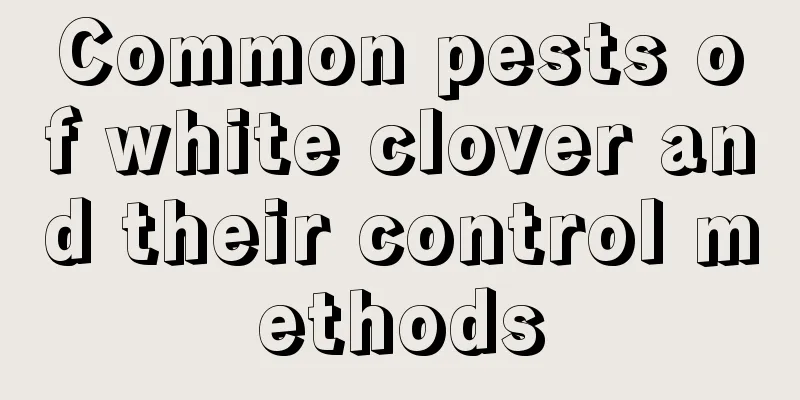Common pests of white clover and their control methods

Common pests of white clover: leafhoppersPest symptomsThe larvae and adults mainly live on the back of leaves and suck the leaf juice. In mild cases, the leaves turn green and small white spots appear on the leaves. In severe cases, the leaves turn pale and their ornamental value is greatly reduced. Prevention and treatment methodsCheck in late April. If larvae are found, spray with 1500 times diluted 50% carbofuran or 2000 times diluted pyrethroid pesticide. The spray should be evenly distributed on the leaves, back of leaves, and inside and outside of the plant. Common pests of white clover: white butterflyPest symptomsOne of the major pests of white clover. From April to October every year, white cabbage butterfly larvae often damage the leaves. The disease is most serious in the dry, hot and rainy summer season, when the larvae can eat all the leaves. The growth potential of affected plants is weakened. Prevention and treatment methodsDuring the larval stage, you can spray green worm fungus to kill them. You can also sprinkle 2.5% dichlorvos powder in the morning before the dew dries. Common pests of white clover: cutwormsPest symptomsIn early spring, the damage to roots and buds is particularly severe in sandy soil. Some of the damage is done by biting off the rhizomes on the ground, while others eat the sprouts from underground, causing the death of large numbers of plants. Prevention and treatment methodsIn addition to the commonly used venom trapping, furadan granules can be applied in ditches or holes, with a dosage of 1500-2000 grams per mu. This drug has a long residual effect and can prevent harm 7-8 weeks after application. Common diseases of white clover: Spodoptera lituraPest symptomsOne of the main pests of white clover. They hide during the day and are active at night. At 1-2 years old, they feed on leaf flesh. At 3-4 years old, they nibble away at the leaf edges, leaving notches. At 5-6 years old, they reach the gluttonous stage, nibbling away at the leaves and even eating them completely. This insect has the property of feigning death, and its larvae have the habit of burrowing in the soil (1-2 cm). Rainfall is beneficial to it, while heavy rain or the invasion of cold air is not favorable to it. Prevention and treatment methodsThe most suitable growth temperature for Spodoptera litura is 15-25℃. Pesticides can be sprayed in the evening or morning. 2.5% trichlorfon powder and 5% carbofuran powder can be used at 22.5-30kg/hectare. You can also use 90% trichlorfon crystals 1000-1500 times diluted, 50% dichlorvos emulsion 1000-2000 times diluted, 50% carbofuran emulsion 1000 times diluted 50-100kg/mu for spraying. |
<<: Common Pests of Purple Jasmine and Their Control Methods
>>: Diseases and pests of red spider lily and their control methods
Recommend
How to grow Pyracantha to get more flowers and fruits
Suitable habitat for Pyracantha Pyracantha is a s...
Take the flowers that have bloomed and use them for cuttings. If they don't survive, come to me.
1. Pruning and cutting of roses after flowering 1...
When and how to plant white radish
White radish planting time White radish has a str...
Does the maidenhair fern prefer shade or sun?
Does the maidenhair fern prefer shade or sun? The...
What to do if the leaves of the succulent money tree become soft and wrinkled
1. Replace the potting soil Reason: The money tre...
How to prune cymbidium orchids
Reasons for pruning Because the flowers of Cymbid...
Succulent care tips
Growing succulents requires not only a suitable e...
How to grow a micro-moon
1. Adequate sunlight In order for the micro-moon ...
How to deal with lilies after they bloom
1. Lily flowering period Its flowering period is ...
Planting technology and cultivation management of white chrysanthemum
White chrysanthemum is also called sweet chamomil...
Orchid growth environment conditions and characteristics
Orchid Growth Environmental Conditions and Requir...
Where is the best place to plant gourds and what kind of soil is suitable for planting them?
Gourd planting area The gourd plant is often plan...
Can kumquat potted plants be fertilized in autumn (when is the best time to fertilize kumquat trees)
Kumquat is a very beautiful fruit-viewing bonsai....
When to carry out ginkgo layering propagation? Ginkgo high pressure propagation
1. Layering time The time for ginkgo layering is ...
Can cheeky plants be grown indoors?
one. Is it possible: Yes, you can. People usually...









